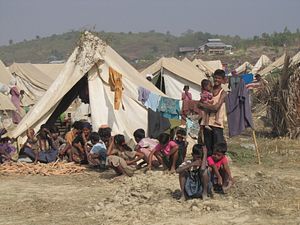A United Nations report on the situation in northern Rakhine State, Myanmar, released on February 3, provides harrowing reading. The report reveals that since a military “crackdown” began on October 9, 2016, more than 90,000 Rohingya have been forced to flee their homes, with an estimated 60,000-plus fleeing to Bangladesh. Rohingya have been subjected to mass killings, beating, forced disappearance, theft, the burning of property, and sexual violence; of the 101 Rohingya women interviewed by the United Nations, 52 percent had been raped or subjected to other forms of sexual violence at the hands of the military.
Perhaps the most gut-wrenching stories are those of the children who have been murdered by security forces. It is difficult to comprehend the kind of vindictive evil which would put a 25 year-old mother through this:
They beat and killed my husband with a knife. They went into my house. Five of them took off my clothes and raped me. My eight-month-old son was crying of hunger when they were in my house because he wanted to breastfeed, so to silence him they killed him too with a knife. I thought I would die, but I survived.
The Rohingya have been vulnerable to human rights abuses for decades. The 1982 Myanmar citizenship law excluded Rohingya from the list of official Myanmar ethnicities, which has left them without citizenship and without the protection of the basic human rights guaranteed by the constitution. Laws in Myanmar provide protection for the human rights of citizens; they provide little guarantees for “foreigners” or the stateless. The daily life of the Rohingya includes totally restricted freedom of movement, forced labor, targeted religious persecution, and a vulnerability to violence with little hope of justice.
On December 29, 23 activists, including 11 Nobel Peace Laureates, warned that a “human tragedy amounting to ethnic cleansing and crimes against humanity is unfolding in Myanmar.” They added, “[I]f we fail to take action, people may starve to death if they are not killed with bullets.” Their words were echoed by the United Nations Special Advisor on the Prevention of Genocide, Adama Dieng, who stated on February 6 that the persecution of Rohingya could amount to “crimes against humanity, and in fact be the precursor of other egregious international crimes.” Dieng then declared that “this must stop right now!”
There is little doubt that the plight of the Rohingya ranks among the very worst humanitarian situations today. If action is not taken Rakhine State may come to be listed alongside Kosovo or Darfur. A united international effort, calling for the Myanmar government to take action, is essential. There has been a mixed response from the international community thus far. Leaders of Western nations have shown little political will to challenge the government of Myanmar led by Daw Aung San Suu Kyi. With Donald Trump, Brexit, and Syria in the limelight, the plight of a helpless minority group on the other side of the world has not been a political priority. On the contrary, during his final months in office, President Barack Obama lifted U.S. sanctions on Myanmar. In his recent trip to Yangon, U.K. Foreign Secretary Boris Johnson failed to publicly mention the situation in Rakhine State despite the House of Commons having debated an Urgent Question on the human rights situation only days before.
The one bloc of the international community to have taken action is the Organization of Islamic Cooperation (OIC). At a meeting on January 19, Malaysian Prime Minister Najib Razak declared that “the killing must stop. The violation of girls must stop.” He was joined by other leaders of Islamic nations in strongly condemning human rights violations. The Rohingya are Muslims who have been victims of targeted religious persecution and therefore it is understandable why Islamic nations have taken up this cause. The United Nations report described how a number of Rohingya were taunted for their Islamic faith. One man said soldiers yelled, “call your Allah to come and save you” as he was being kicked, punched, and shot at.
In this context it is right that the OIC nations speak up but it is vital that they are not the sole voice or this could become a political football which is kicked about without stemming the grievous human suffering. A cynical reading of Najib’s actions would see his advocacy for the Rohingya as an attempt to distract from domestic pressure. The persecution of Rohingya is to some extent motivated by a fear of Islam; if it is only Muslims speaking out, that could exacerbate rather than constructively resolve this desperate situation.
Furthermore, if Westerners do not stand for the rights of Rohingya Muslims, there are dangers that their suffering could fuel global terror. The Ohio State attacker in November claimed that it was the abuse of Myanmar’s Muslims which pushed him to a “boiling point” and led him to conduct a knife attack in the United States.
A united international response is necessary. The United Nations Human Rights Chief, Zeid Ra’ad Al Hussein, said on February 3 that:
The devastating cruelty to which these Rohingya children have been subjected is unbearable – what kind of hatred could make a man stab a baby crying out for his mother’s milk? And for the mother to witness this murder while she is being gang-raped by the very security forces who should be protecting her – what kind of ‘clearance operation’ is this?” … I call on the international community, with all its strength, to join me in urging the leadership in Myanmar to bring such military operations to an end. The gravity and scale of these allegations begs the robust reaction of the international community.
His words provide an urgency which must be heeded by all in the international community.
Johnny Patterson is a human rights activist based in London

































